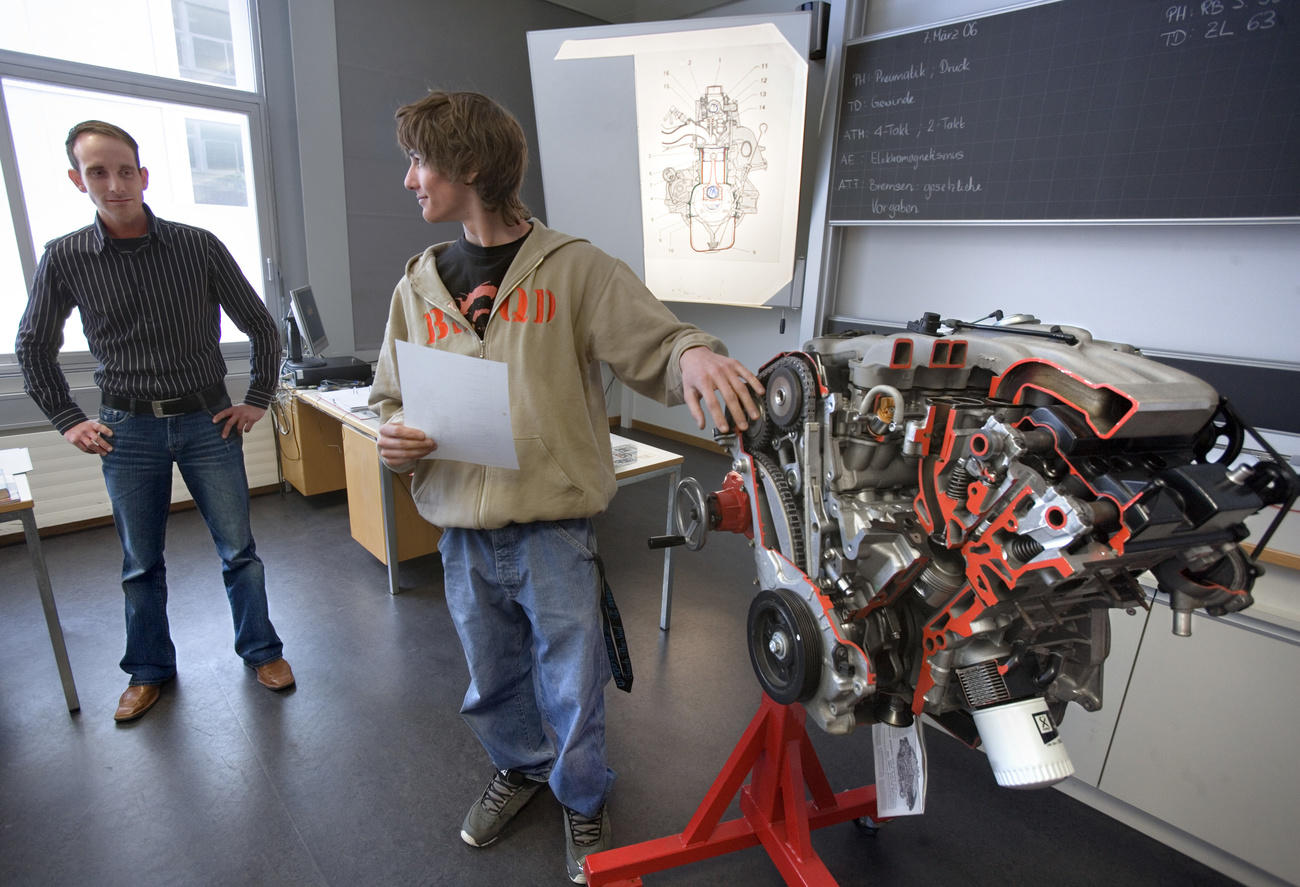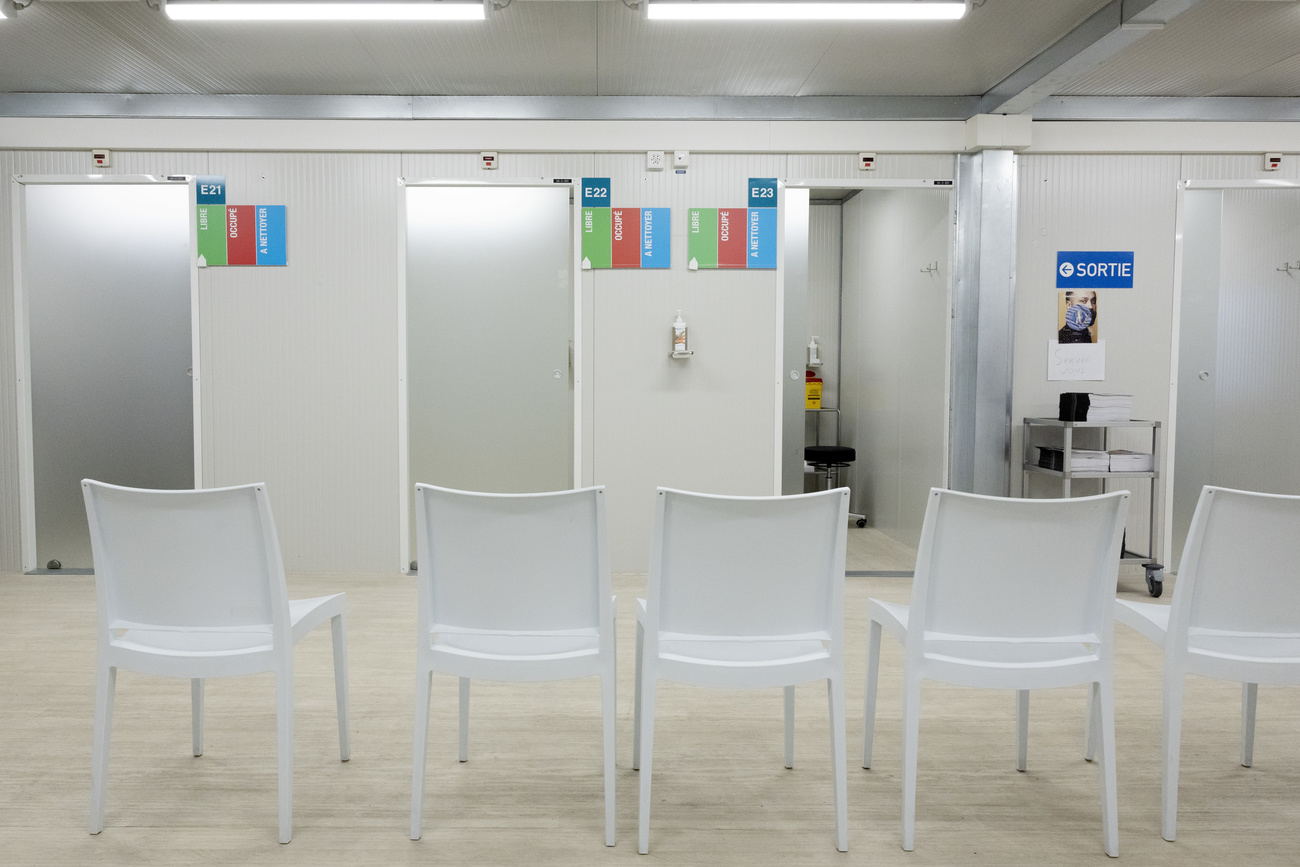
Why is the drop-out rate so low in Switzerland?

The number of young people not in work, education or training (NEETs) in Switzerland is the one of lowest in Europe. But experts warn there is still cause for concern, as these youths struggle to find the right support and acceptance.
NEETs is an internationally accepted designation for the number of young people who are no longer in the labour market or education/training (“disconnected youth” in the United States). The term gained extra prominence in the late 2000s, when the economic crisis forced youth unemployment levels to rise and fears grew that some would be permanently locked out of the jobs market.
The proportion of NEETs in the younger population varies from country to country. In Switzerland, it stands at 6.3% of 15-29 year olds (90,000 people), according to the latest Swiss Federal Statistical Office (FSO) statisticsExternal link published on February 8 this year. This is among the lowest in Europe, as the Eurostat graphic below shows. Swiss neighbour Italy has the highest proportion at 23.3%.
Among the reasons why Switzerland fares so well compared to other European countries is its good public education system, and excellent vocational training – its dual track apprenticeships (which combine training and vocational school) are chosen by two thirds of young people.

More
Why Switzerland’s dual-track education system is unique
A look at the table also confirms low NEET rates in other countries with strong apprenticeship systems like Austria and Germany.
Falling rate
The number NEETS in Switzerland has actually been falling over the past decade, the FSO said: in 2010, it stood at 8.1% of those aged 15-29.
And the decrease has affected both types of NEETS – Switzerland makes a distinction between the “unemployed and job seeking” and the “economically inactive” which includes those with family caring duties, in military/civilian service (still compulsory for young men in Switzerland) and on language programmes abroad, as well as those struggling with workplace integration.
“The decrease in NEET is most visible among women, whose NEET rate decreases from 9.6% to 5.9% [during this time], while it remains stable among men (2010: 6.7%; 2020: 6.6%),” the FSO’s Thierry Murier told SWI swissinfo.ch in email comments.
“One development that explains this situation is the decrease in the number of people (mainly women) indicating “Family and personal responsibilities” (1.8% of people aged 15-29 in 2010 to 0.6% in 2020, i.e. 23% respectively 10% of the total number of NEET).”
NEET factors
This is significant because being a young woman is a traditional NEET risk factor, as various internationalExternal link and Swiss studiesExternal link have shown. Other factors include a lower level of education and, as the OECD pointed out in its 2021 Education at a GlanceExternal link report on Switzerland, having a migrant background (it found a five percentage point difference in NEET rate between foreign-born and native-born young adults, so 10.7% compared to 5.9%, according to its figures).
Health, including mental health issues, and family problems, are also a topic among NEETS.
But overall, there is no “typical” NEET, explains Dr Claudia Meier Magistretti, professor at Lucerne University of Applied Sciences and Arts, who co-leads a Swiss research project on NEETSExternal link. But what they do have in common is that they struggle to find acceptance.
Many NEETS find school, with its emphasis on individual and process-oriented learning, difficult. “The most important factor is, however, that we are a rich country, so many NEETs are staying at home, and their parents are paying for them, helping them and trying to get them a job, in some cases for years,” Meier Magistretti explained.
“We likely have a high number of unrecorded cases because these people do not show up in the public statistics.”
The official figure hides many disparities among Switzerland’s youth. NEETS are often vulnerable people that fail to integrate over a period of time.
“Society’s always a good as it treats its weakest members and people don’t treat NEETS well in Switzerland,” Meier Magistretti, who has recently published a book chapterExternal link on the issue, told SWI swissinfo.ch. “It’s not so easy for young people when you are 18-27 and you can’t find a place in society, but you want to, and you are confronted with several obstacles that you cannot overcome.”
Meier Magistretti said many NEETS are longer term. “These people have fewer chances of coming out of this situation the longer the situation lasts. They also cause immense costs as they are dependent on welfare benefits like social security and disability insurance,” the professor explained. “They also have a lot of health problems, sometimes also as a consequence of being a NEET.” This can include depression, and dependence on drugs and alcohol.
Support
Support does exist for NEETs in Switzerland, but it is patchy – it often depends in which canton you live – and it does not always work, she says.
“Success rates of job coaches and job placements, case management networks, and programmes are low for this age group, although they are successful for adults. The reason lies in a mismatch between the too many but inadequate offers that are driven by an economics logic, and the individual and heterogenous problems of the young adults in a NEET situation” Meier Magistretti observed.
In their recent chapter, the professor and her colleague said that the Swiss support system would work better if it had an increased understanding of the young adults and their situations as a whole, rather than just focusing on getting a person into the workforce. The study also found a big desire for some sort of normality among the NEETs surveyed.
Covid effect?
But what effect could the Covid pandemic have on Swiss NEET figures for 2021/2?
Meier Magistretti expects a change. “Covid most probably led to an increase in the number of NEETs due to psychological stress especially in vulnerable populations of young people,” she said.
The European Union’s Eurostat officeExternal link too has indicated that it expects the economic downturn due to the Covid pandemic to result in higher numbers of NEETs across the continent.
Official Swiss statistics will come later. The FSO says it does not yet have enough information to describe the situation for the Covid period. Due to the revision of the survey on which NEETS are calculated, the 2021 results are expected to be released in the second half of 2022.

In compliance with the JTI standards
More: SWI swissinfo.ch certified by the Journalism Trust Initiative











































You can find an overview of ongoing debates with our journalists here . Please join us!
If you want to start a conversation about a topic raised in this article or want to report factual errors, email us at english@swissinfo.ch.